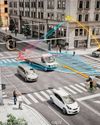Essayer OR - Gratuit
Will The Indian Innovation Gene Redefine Mobility?
Auto Tech Review
|September 2018
India is a fascinating geography, and I say this in reference to not just the ethnicity and diversity of the country; but also in reference to the zeal that India has to grow, to do better, to innovate and to prosper! India is known as the country of innovation, and has given to the world the concept of zero, chess, Vedic mathematics, astronomy, philosophy, yoga and more. Innovation thrives in every nook & corner of our country, be it big or small.
-

I have always been amazed at the micro innovations that keep bubbling in all the small corners of our country and as an active follower of the automotive segment, the ones in the mobility space specially catch my eye. When the planned development for mobility inside cities moved towards building metros, I was astonished to see the quick identification of opportunity and requirement for last mile connectivity, which resulted into basic motor and battery combination vehicles cropping up on the roads. These locally made electric three-wheelers address requirements, which weren’t planned for earlier. Sure, these contraptions might break down frequently and have no standardisation from piece to piece, but they keep the economy of our cities moving. What’s worth appreciating is the innovation that went behind it – simple yet inexpensive. Such is the ingenuity of India.
Coming to the bigger picture, while the world is moving to shared mobility systems, it is interesting to know where India has reached, even after being one of the late adopters of modern shared mobility. Morgan Stanley predicts that by 2030, nearly 35 % of all miles travelled in India will be shared. This is just an example of the trend. With one of the largest population, fastest growing economies and approximate penetration of only 25 vehicles per 1,000 people in India, we still have one of lowest per capita emission count.
Cette histoire est tirée de l'édition September 2018 de Auto Tech Review.
Abonnez-vous à Magzter GOLD pour accéder à des milliers d'histoires premium sélectionnées et à plus de 9 000 magazines et journaux.
Déjà abonné ? Se connecter
PLUS D'HISTOIRES DE Auto Tech Review

Auto Tech Review
Sound Generation For Enhanced Road Safety
With an ever-increasing number of fully electric and hybrid vehicles entering the market, we are witnessing a change in the acoustic experience in and around the car. The silent nature of the electric powertrain means that other road users miss the familiar acoustic cues that warn them of an approaching vehicle. To remedy this situation, Harman is working on various noise management solutions.
6 mins
August 2020

Auto Tech Review
OBJECTIVE ASSESSMENT OF THE SAFETY CONTRIBUTION OF TODAY'S AUTOMOTIVE HEADLAMPS
Good lighting makes a major contribution to road safety. In 2011, the International Commission on Illumination (CIE) presented an evaluation system for headlamps that can objectively assess the quality of illumination and glare limitation. New light sources like LEDs and lighting functions (glare-free high beam, partial high beam) have been available for several years, so that an extension of the proven CIE method is necessary, which takes into account, among other things, changed switch-on and service lives of new lighting functions and represents a generally understandable evaluation system. An evaluation system presented in the following by the Technische Uni versität Darmstadt, which was developed by an encompassing expert commission, is intended to provide representative data and enable an objective evaluation of headlamp performance.
8 mins
August 2020

Auto Tech Review
RAPIDO RE-INNOVATES TO CATER TO POST COVID-19 LAST MILE CONNECTIVITY
The rapid pace of urbanisation in the country has witnessed cities expanding and subsuming surrounding villages and smaller towns, evolving into Tier II and III cities.
5 mins
August 2020

Auto Tech Review
FUNCTIONAL SAFETY STANDARDS TOP PRIORITY FOR FUTURE AUTOMOTIVE DEPLOYMENT
Increasing levels of electronic content in vehicles result in a large amount of software that is required to run the scenes behind the mechanical aspects of a vehicle. Electronic systems in automobiles are part of every section, from the powertrain to comfort and convenience systems as well as all types of safety equipment. This makes electronics and the software running these systems a critical part of the equation for future mobility solutions. In addition, putting standards in place to measure methods of developing, testing and functioning of such electronic systems also becomes highly relevant.
5 mins
August 2020

Auto Tech Review
“BYD'S EV STRATEGY TO ENCOMPASS MOST FORMS OF TRANSPORTATION NEEDS IN INDIA”
The country’s electric vehicle (EV) ecosystem is grappling with a plethora of challenges even as it is striving to wriggle itself out of the ‘nascent stage’ tag. In an exclusive chat with Auto Tech Review, Zhang Jie Ketsu, Executive Director, BYD India shares his perspective on the current EV scenario and how the company intends to progress faster in the Indian automotive industry
7 mins
August 2020

Auto Tech Review
SAFETY IN ELECTRIC AND AUTONOMOUS CARS – SIMULATION OF COMPLEX CRASH SCENARIOS
Electric and autonomous vehicles allow for novel seating arrangements and packaging strategies, presenting new safety challenges. Physical crash testing must be supplemented with virtual simulation to ensure vehicle safety on shorter development cycles. With its Simcenter Madymo MBS software, Siemens provides improved runtimes and the Active Human model, enabling accurate and rapid occupant safety analysis in complex crash scenarios.
6 mins
August 2020

Auto Tech Review
KIA SONET – A MIGHTY OFFERING IN THE COMPACT SUV SEGMENT
It wouldn't be wrong to say that Kia Motors India has taken the Indian market by storm in less than 12 months of its presence in the market.
4 mins
August 2020

Auto Tech Review
NISSAN'S NEW DIRECTION: ARIYA ALL-ELECTRIC
Marking a key milestone in Nissan’s transformation strategy, Ariya ticks a lot of boxes highlighting the strengths of the global automotive giant.
5 mins
August 2020

Auto Tech Review
BETTER SAFETY WITH EMERGENCY BRAKE ASSIST FOR MOTORCYCLES
Rear-end collisions with a slower vehicle suddenly cutting into the lane and intersection accidents with cross-traffic are among the most frequent motorcycle accident types. Continental is now developing an emergency brake assist, which detects an imminent collision with a vehicle ahead or with an obstacle, warns the rider and supports him during braking
7 mins
August 2020

Auto Tech Review
ADAS WILL SERVE AS CATALYST FOR IMPROVED VEHICLE SAFETY
The automotive industry across the globe is increasingly focussing on safety.
5 mins
August 2020
Translate
Change font size

